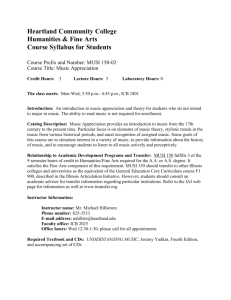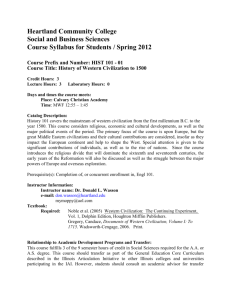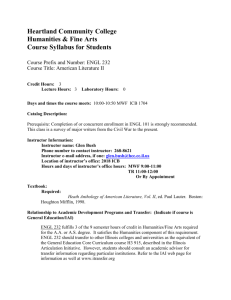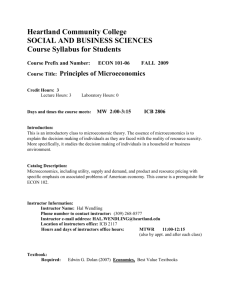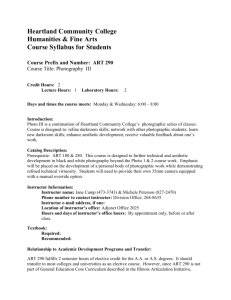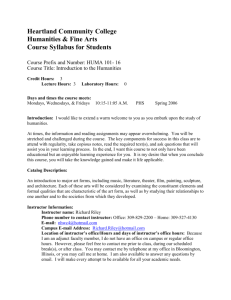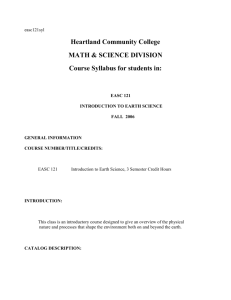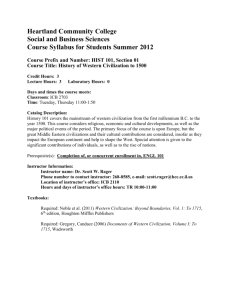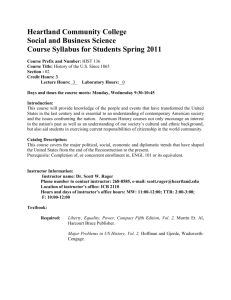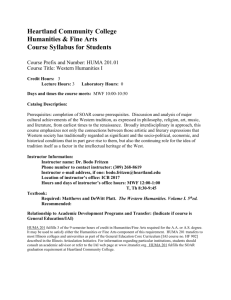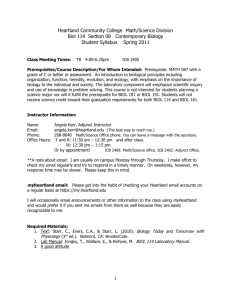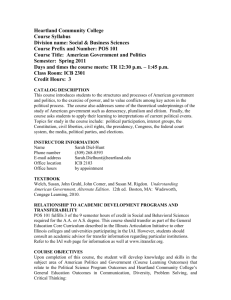hist101-pchs-wasson-sp07 - Heartland Community College
advertisement
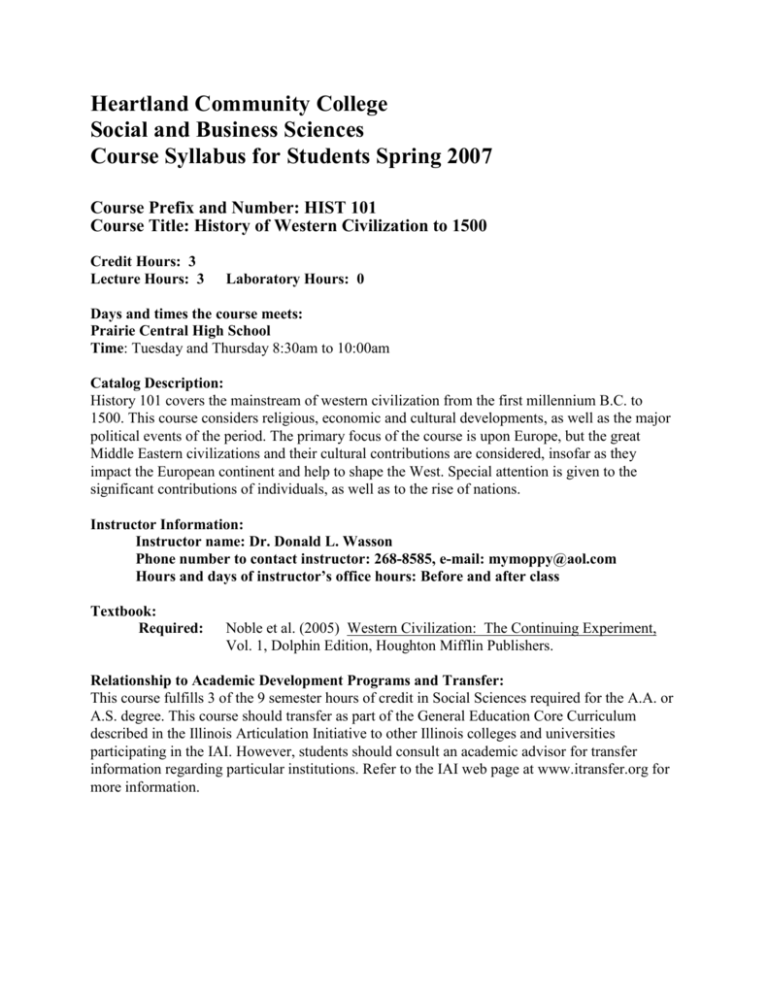
Heartland Community College Social and Business Sciences Course Syllabus for Students Spring 2007 Course Prefix and Number: HIST 101 Course Title: History of Western Civilization to 1500 Credit Hours: 3 Lecture Hours: 3 Laboratory Hours: 0 Days and times the course meets: Prairie Central High School Time: Tuesday and Thursday 8:30am to 10:00am Catalog Description: History 101 covers the mainstream of western civilization from the first millennium B.C. to 1500. This course considers religious, economic and cultural developments, as well as the major political events of the period. The primary focus of the course is upon Europe, but the great Middle Eastern civilizations and their cultural contributions are considered, insofar as they impact the European continent and help to shape the West. Special attention is given to the significant contributions of individuals, as well as to the rise of nations. Instructor Information: Instructor name: Dr. Donald L. Wasson Phone number to contact instructor: 268-8585, e-mail: mymoppy@aol.com Hours and days of instructor’s office hours: Before and after class Textbook: Required: Noble et al. (2005) Western Civilization: The Continuing Experiment, Vol. 1, Dolphin Edition, Houghton Mifflin Publishers. Relationship to Academic Development Programs and Transfer: This course fulfills 3 of the 9 semester hours of credit in Social Sciences required for the A.A. or A.S. degree. This course should transfer as part of the General Education Core Curriculum described in the Illinois Articulation Initiative to other Illinois colleges and universities participating in the IAI. However, students should consult an academic advisor for transfer information regarding particular institutions. Refer to the IAI web page at www.itransfer.org for more information. Course Objectives (Learning Outcomes): At the completion of this course, the student should be able to: 1. Demonstrate awareness and appreciation of the culturally diverse roots of Western Civilization. 2. Appreciate how knowledge of the historical roots of civilization broadens ones experience and understanding of ancient and contemporary issues. 3. Identify and appraise the key processes in the cultural transformation that occurred during the creation of the Classical and Medieval worlds. 4. Demonstrate the skills necessary for independent study 5. Demonstrate advanced reading and writing skills. 6. Demonstrate the ability to apply the perspective gained from a knowledge of the past to the problems of today. 7. Demonstrate an ability to think historically. Course/Lab Outline: Topic Outline for the Course: The Civilization of the Ancient Near East Hellenic Civilization The Roman World The Byzantine Recovery and the Challenge of Islam Charlemagne and the Carolingian Empire The High Middle Ages The Crusades The Late Middle Ages The Renaissance Course Policies: Method of Evaluation (Tests/Exams): 2 exams (Mid-term and Final) 2 quizzes 1 research paper 1 biography paper class participation/ attendance Attendance: Students are expected to attend all classes and participate meaningfully in the activities each class day. Attendance will be taken at each class meeting Incompletes: Under extra-ordinary circumstances an incomplete may be given at the instructor’s discretion, if the student has completed more than 50% of the graded assignments and if the instructor believes the student is likely to finish the course. No one has an automatic right to receive an incomplete. Extra-Credit: No extra credit is anticipated for this class. Make-up of Tests and Assignments: All make-ups are granted at the discretion of the instructor and will be determined according to the individual merits of the case. Students are required to contact the instructor by mail or by phone to make arrangements for a make-up. Required Reading and Writing: This course requires approximately 30-40 pages of reading per session or 500 per semester. A minimum of 15 pages of college level writing is required in this course. Writing assignments include two 3-5 page research papers, essays on exams, and other projects as deemed appropriate by the instructor. Student Conduct: At all times students should endeavor to conduct themselves in an honest and mature manner. Cell phones should be turned off. Academic Integrity Academic integrity is a fundamental principle of collegial life at Heartland Community College and is essential to the credibility of the College’s educational programs. Moreover, because grading may be competitive, students who misrepresent their academic work violate the right of their fellow students. The College, therefore, views any act of academic dishonesty as a serious offense requiring disciplinary measures, including course failure, suspension, and even expulsion from the College. Violations of academic integrity include, but are not limited to cheating or other acts of academic dishonesty, plagiarism, misrepresentation of data, falsification of academic records or documents and unauthorized access to computerized academic or administrative records or systems. Definitions of these violations may be found in the college catalog Plagiarism Plagiarism is the presenting of others’ ideas as if they were your own. When you write a paper, create a project, do a presentation or create anything original, it is assumed that all the work, except for that which is attributed to another author or creator, is your own. Plagiarism is considered a serious academic offense and may take the following forms: 1. 2 3 4 5 Copying word-for-word from another source and not giving that source credit. Paraphrasing the work of another and not giving that source credit. Adopting a particularly apt phrase as your own Using an image or a copy of an image without crediting its source Paraphrasing someone else’s line of thinking in the development of a topic as if it were your own. 6 Receiving excessive help from a friend or elsewhere, or using another project as if it were your own. Note that word-for-word copying is not the only form of plagiarism. [Adapted from the Modern Language Association’s MLA Handbook for Writers of Research Papers. New York: MLA, 1995: 26] Support Services: Academic Support Services (Academic Support Center) www.hcc.cc.il.us/divisions/asc Heartland Library Information The Library, located in the Students Commons Buildings at the Raab Road campus, provides Heartland students with a full range of resources including books, online journal databases, videos, newspapers, periodicals, reserves, and interlibrary loan. Librarians are available to assist in locating information. ISU now accepting HCC Library Cards! HCC now accepting ISU Library Cards! Heartland students can now check out items from ISU’s Milner Library by showing a punched HCC library card and a photo ID. Get your library card punched at the Library desk and you are good to go. Because Heartland Community College Library is now a member of ILCSO (Illinois Library Computer Systems Organization), Heartland students, faculty, and staff can check out materials from 64 academic libraries across the state, including ISU, Illinois Wesleyan, University of Illinois, etc. (see http://office.ilcso.illinois.edu/About/ilcsolibs.html for a complete list). Likewise, patrons from other ILCSO libraries may now check out materials from Heartland Community College Library with their institutional IDs. Also, as members of ILCSO we will be switching over our card catalog from CARL to ILLINET online. Not only will this allow for better searching capabilities, there will also be expanded interlibrary loan services. For more information please call the Library (309) 268-8200 or (309) 268-8292 Tutoring Center Heartland Community College offers tutoring in various forms at not cost to Heartland students at the Academic Support Center (ASC) in Normal and at the Pontiac and Lincoln Centers. Tutors are available at convenient times throughout the week. Study groups, group tutoring facilitated by a specially-trained tutor, are also available by request. For more information about services available at each location, please call the ASC in Normal (309) 268-8230; the Pontiac Center (815) 842-6777; the Lincoln Center (217) 735-1731. Testing Center The Testing Center provides a quiet environment for students to complete make-up exams, online exams, and exams for students with special accommodations. Students may be able to complete exams in the Testing Center if arrangements are made with their instructor. For more information, contact the Testing Center at (309) 268-8230. Open Computing Lab www.hcc.cc.il.us/asc/computerlab.html The Open Computing Lab provides free computing for HCC students at convenient times throughout the week. The computer lab is staffed by trained Lab Assistants and offers the use of approximately 70 computers, a scanner, a laser printer, and an electric typewriter. Specifications for written materials: Written materials will be formatted exactly as they are in English classes, ie standard MLA format. Standard Syllabi Disclaimer: Changes to the Course Calendar may be made during the course of the class. This is sometimes unavoidable and students will be notified in class should changes become necessary. COURSE CALANDAR Week 1 1/16 – 1/18 - Early Civilizations - Chapter 1 Week 2 1/23 – 1/25 - Greece – Chapter 2 Week 3 1/30 – 2/1 - Greece - Chapter 3 (Quiz – Chapters 1 -3 ) Week 4 2/6 - 2/8 - Alexander the Great – Chapter 4 (Topic Due for Biography) Week 5 2/13 – 2/15 - Rome – Chapter 5 Week 6 2/20 – 2/22 - Rome - Chapter 6 2/27 –3/1 - Late Antiquity – Chapter 7 (Biography Papers Due) Week 7 3/6 – 3/8 - Review and MIDTERM Week 8 3/13 -3/15 - Spring Break/No Class Week 9 3/20 – 3/22 - Islam/Byzantium/Charlemagne = Chapter 8 (Research Topic Due) Week 10 3/27 – 3/29 - High Middle Ages – Chapter 9 Week 11 4/3 – 4/5 - Medieval Civilization – Chapter 10 (Quiz – Chapters 8 – 10) Week 12 4/10 – 4/12 – Crisis and Recovery – Chapter 11 Week 13 4/17 – 4/19 – Renaissance – Chapter 12 Week 14 4/24 – 4/26 - Expansion to the New World – Chapter 13 Week 15 5/1 – 5/3 - Reformation – Chapter 14 Week 16 5/8 – 5/10 – Religious Wars – Chapter 15 (Research Paper Due) Week 17 5/15 FINAL EXAM
